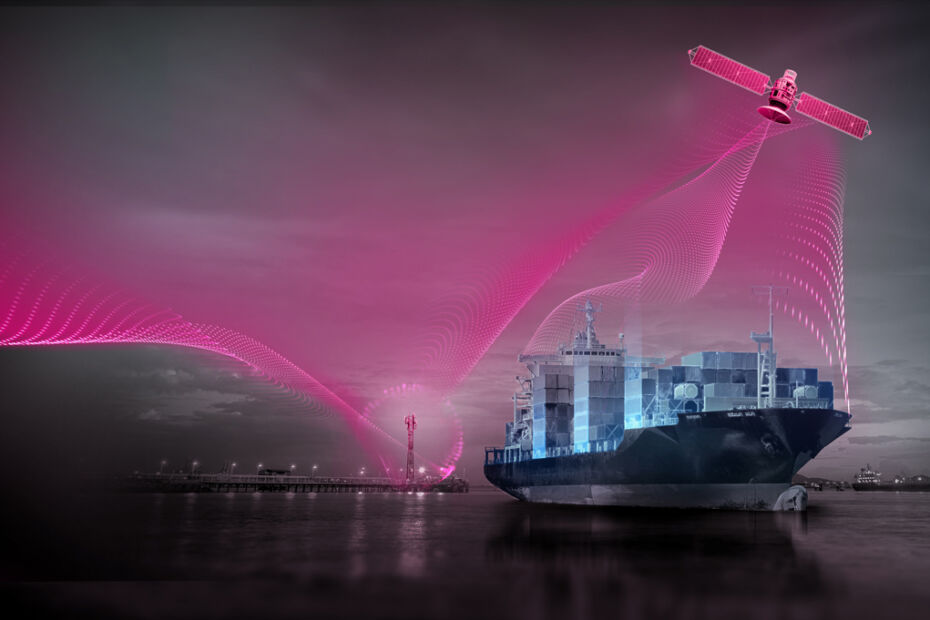Deutsche Telekom, Intelsat and Skylo aid supply chains
- March 1, 2023
- Steve Rogerson

Deutsche Telekom wants to create a seamless IoT network to help global supply chains in partnership with Intelsat and Skylo.
In the future, satellite communications will complement classic terrestrial IoT networks such as NB-IoT, LTE-M, 4G and 5G. To this end, Deutsche Telekom is working with satellite specialists Intelsat and Skylo.
Together, they are presenting the first use cases at this week’s Mobile World Congress (MWC) in Barcelona. These include networking wind turbines in remote regions, recording water levels and weather data at risk locations in AI quality, and broadband connections on the high seas, all possible with a global IoT network it has already tested. A commercial offering is planned for the second quarter of this year.
In the future, companies will communicate securely and stably with their IoT devices across oceans and continents. Areas with low cellular coverage, data transmissions across large expanses of water or in the air can benefit from satellite communications that can be gapless, with reliability and guaranteed data rates, and affordable.
“With integrating satellite connectivity into our T IoT offering we are reshaping the future of global IoT networking,” said Dennis Nikles, CEO of Deutsche Telekom IoT. “Our customers now have a network of networks with ubiquitous connectivity which enables completely new possibilities. For our customers, this means best network connectivity everywhere, one point of contact, maximally simple and comprehensive – T IoT, we connect everything everywhere.”
In the second quarter of 2023 Deutsche Telekom will launch with an offering for convergent connectivity: the interface is the IoT Hub, the orchestrator for universal connectivity across various mobile and satellite networks. The appropriate hardware, such as a satellite terminal or router, plus an installation service can be booked as an option.
Initial partners are Intelsat for broadband applications and Skylo for NB-IoT via satellite.
Intelsat is an operator of satellite services with global coverage. The satellite network provides a foundation for critical enterprise applications across a range of industries. The partnership with Intelsat enables Deutsche Telekom’s IoT customers to use a global satellite infrastructure directly and forms an important non-terrestrial building block for Deutsche Telekom’s network-of-networks.
In addition, Skylo opens the use of convergent cellular devices for companies for their IoT applications for the first time. Thanks to direct-to-device 5G NTN technology standards (3GPP release 17), certified NB-IoT-capable device or modules will also be able to connect to the satellite network without the need for extra hardware. It will then switch autonomously and seamlessly between terrestrial and non-terrestrial networks. Use cases relevant to this include tracking goods and transparency of supply chains around the globe.
At the end of the year, Deutsche Telekom plans to launch an early adopter programme for developers who can test convergent end devices for the first time.
Companies from various industries are testing this offering in various applications, which are also being demonstrated at MWC. For example, Lanthan is networking wind turbines in remote areas that are not yet sufficiently covered by mobile communications. Here, the safety of flight operations is the top priority. To this end, the turbines must transmit their light signals in a fail-safe manner. In addition, there are strict environmental regulations to reduce light pollution and interference with nature. These are requirements for permanent network availability with frequent data transmissions, making a clear case for connectivity via satellite. The cooperation partner is Intelsat.
Data specialist Divirod helps municipalities and companies inform and warn about water risks quickly and digitally. For this, digital sensors record water levels in reservoirs and rivers, or monitor coasts or snow amounts on roofs. For example, sensors collect water data in risk areas such as Florida as a precaution against storms and protect the cultural heritage in Venice.
Now the German Federal Waterways & Shipping Administration (WSV) is testing this service. The goal is to collect AI-quality data on water levels, flow rates, temperature and quality. This makes inland navigation safer and protects plant and animal life. For example, pollution from agriculture or industry can be monitored accurately. This requires an uninterrupted flow of data over several weeks. This is possible with satellite communications from T IoT with Intelsat.





